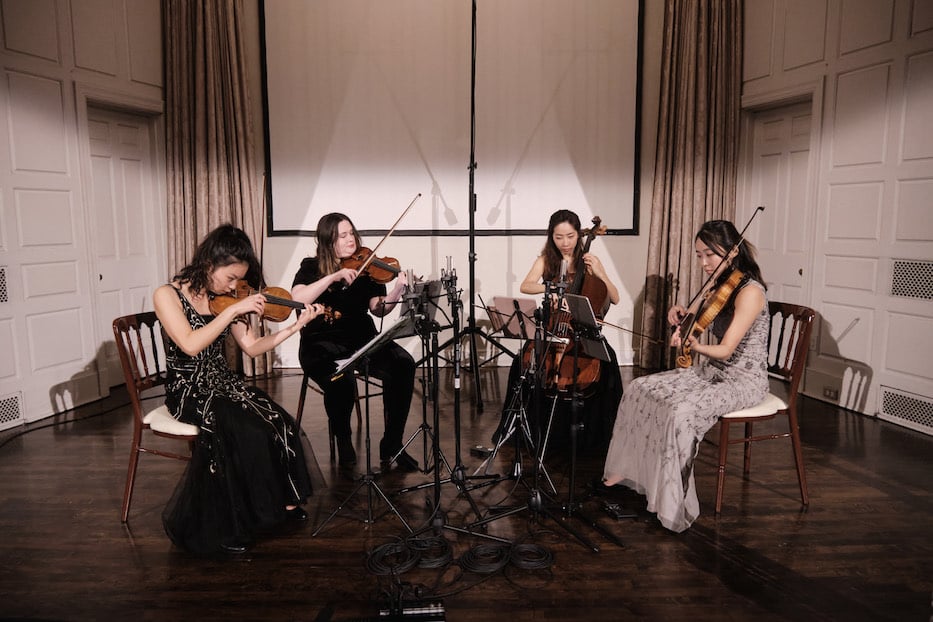
Lukas Flippo Photo. Courtesy of Kallos Chamber Music Series.
The vaulted-ceiling ballroom of the New Haven Lawn Club fell to a hush as its audience observed a moment of silence for the people in Ukraine. Then the first strains of Sirena Huang’s violin broke through, cutting in with a resonant melody that rose then fell, solemn and imploring. The violinist to her right, Ariel Horowitz, and the violist, Halam Kim, trailed one beat behind, with phrases that harmonized the first violin. The low register of Christine J. Lee’s cello kept pace. Myroslav Skoryk’s “A Melody” filled the space.
At a time when they felt helpless in the face of Russia’s invasion of Ukraine, the four performers used music to spark conversation with no words at all.
The performance, entitled “Songs Without Words,” came as part of the Kallos Chamber Music Series’ residency at the New Haven Lawn Club Wednesday night. Over two hours, musicians Horowitz (violin), Huang (violin), Kim (viola), and Lee (cello) played a program of four arrangements from Austria, Czechoslovakia, Austria, Finland, and Norway, with a finale from Ukraine. A virtual version of the concert, scheduled to stream on March 16, will double as a fundraiser for the Ukrainian Red Cross.
“[The songs are] all from different cultures—ok, from Europe,” Lee mused. “They all have their own individual voice. It’s maybe a utopian idea but we can all exist and learn and share.”
Nowhere was that more moving, perhaps, than during Skoryk’s 1982 “A Melody.” As the four musicians moved into the work, Skoryk’s solemn refrain continued again, with slight variation. The repetition of the melody turned it from a single declaration into recurring plea. With the end of the phrase, the musicians aligned in a decrescendo, the lower tones of the second violin, the viola, and the cello complementing Huang’s higher-pitched lead.
As the quartet continued, the second violin and viola picked up the melody, echoing and weaving around each other. Huang initiated the melody, her fingers moving along the neck of her violin in a dexterous pattern. A second later, Kim repeated the pattern, only in a different octave, on her viola. Then Horowitz joined, in the same pattern, different octave. What became a mournful plea became a collective one, various and full.
The quartet played as if members had been playing together for years. In actuality, they had rehearsed for a total of 15 hours over the course of six days. Their musical relationship as a group began on Thursday March 3, as Russia closed in around the Ukrainian Southeast port city of Mariupol. They picked up their bows and instruments as Russian troops in armored vehicles cut towards the capital city of Kyiv, held up by Ukrainian resistance fighters.
The musicians, who were reading the news between practice, were shaken.
“Sometimes it feels really difficult [to read the news] and then after reading the news, you go back and practice and you try and work on intonation or work on sound and phrasing and it’s like, ‘How is this relevant to the world?’" Huang reflected onstage to the audience. “And I know many musicians feel that way in a time like this. And we wish there was more we could do with our passion.”
When the four got together on the first day of rehearsal, they discussed their feelings of helplessness. What could they do, they collectively wondered, to be helpful? Their response drew on what they knew best: music.
Huang came up with the idea of playing Skoryk’s “A Melody.” The Kallos founder Min Young Kang suggested making a recording of the performance available for livestream, as Kallos has done with almost all of its concerts in the past two years. The proceeds of tickets would go toward the Ukrainian Red Cross Society.
“When we’re feeling at a loss of words, playing music actually gives us a lot of strength and hope,” Lee said.
Onstage, Lee gave a swift nod of her head to signal the transition into the final section of the piece. Without breaking concentration, the other three members looked toward Lee, eyes darting, and then launched into their parts. The musicians, sitting in chairs spaced apart from one another, seemed connected by an invisible thread.
In the final section of the song, the melody repeated–this time, at a faster pace. The song crescendoed into a melancholic urgency. Then just as quickly, the pace of the four’s bowing slowed. Lee closed her eyes, as the last notes of the song hung in the air. The mood was somber, and also resolute.
“In the art form [of chamber music] itself, there is no one right way–there’s dialogue and there’s listening and there’s communication,” Horowitz said. “I wish all that world leaders could play chamber music.”
Learn more about the Kallos Chamber Music series, including a March 16 fundraiser for the Ukrainian Red Cross Society, at the group's website.